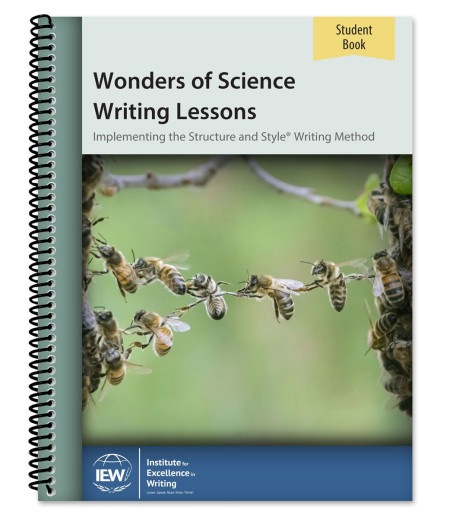We use cookies to make your experience better. To comply with the new e-Privacy directive, we need to ask for your consent to set the cookies. Learn more.
Wonders of Science Writing Lessons (Student Book)
This Student Book includes assignments, blank outlines, source texts, checklists, vocabulary cards, and grammar helps for two levels of students—basic and advanced.
This book is designed to be used by an instructor who has been through or is currently viewing the Teaching Writing: Structure and Style video course.
This theme-based writing curriculum offers a full year of instruction for students in grades 4–7 and is perfect for homeschoolers, homeschool co-ops, tutors, and hybrid schools.
This series will help your student develop composition skills using a science theme. Implementing high-interest content, discussing scientists, engineering, and life sciences, this year-long composition course simultaneously engages with high interest reading while also helping students grasp an important aspect of reading and composition skills: learning. Over the course of 30 lessons, students will practice applying the IEW writing techniques. Students will write from notes and outlines, retell narrative stories, and summarize multiple references. They will read and engage with the included, varied source texts (such as Rumplestiltskin; the story of Icarus; brief paragraphs on honeybees or meteorites; articles on famous scientists such as Albert Einstein, Maria Telkes, and George Washington Carver). Then, students will engage with the subject matter by completing assorted assignments, including writing from pictures, retelling narratives (such as Jack in the Beanstalk), summarizing references, inventive writing, formal essays, critiques, and responses to literature.
The consumable Student Book provides the reading material and helps the student practice and apply the unique IEW Structure & Style methodology, so you’ll see familiar lingo in the composition assignments. For example, students will always write a KWO (Key Word Outline), practice using 6 different “openers,” remove “banned words,” practice using clauses, and more. This course also emphasizes responding to literature and vocabulary acquisition (words come from reading and from the composition skills taught). Appendices include a modified MLA format guide (for those typing papers); mechanics; a critique thesaurus; suggested literature add-ons; and vocabulary (listed by lesson, with 6 quizzes).
The Teacher’s Manual includes reduced pages with student sample answers filled in. Outer-margin notes reference specific information; identify the downloadable files needed; indicate whether new rules, styles, or concepts are being introduced practiced, etc. The TM Appendices duplicate the five found in the student book, with the addition of “Review Games” which provides 16 games to help students review concepts and vocabulary words, apply parts of speech, apply writing concepts, and more. This course assumes that you as teacher have viewed the Teaching Writing: Structure and Style video course and own the Seminar Workbook, so that you can review the appropriate information connected with the course.
The suggested weekly schedule: Day 1: review vocabulary and learn the model/writing concepts. Any new structure concepts are introduced. Read the source text and write a KWO. Day 2, learn any new style or vocabulary. Review the KWO; learn the new stylistic technique; study vocabulary and complete exercises; use your KWO to begin a rough draft. Days 3 and 4 are more independent. On Day 3: review vocabulary words; finish writing your composition and check your writing with the checklist. Finally, on Day 4 write your final draft, use a checklist to check off tasks, make corrections recommended by your editor, and submit final draft.
For your immediate family, free downloadable resources come with purchase of the TM and creating an account with IEW: vocabulary cards, reproducible checklists, and exemplars. To adapt this course for varying grades and abilities, two free, downloadable files are offered: Simplified Source Texts or Advanced Additions. In co-ops or classrooms, each teacher must have their own Teacher Manual.
| Product Format: | Other |
|---|---|
| Grades: | 4-7 |
| Brand: | Institute for Excellence in Writing |
| Length in Inches: | 11 |
| Width in Inches: | 9 |
| Height in Inches: | 1 |
| Weight in Pounds: | 1.7 |
Be the first to review this item


Looks nice